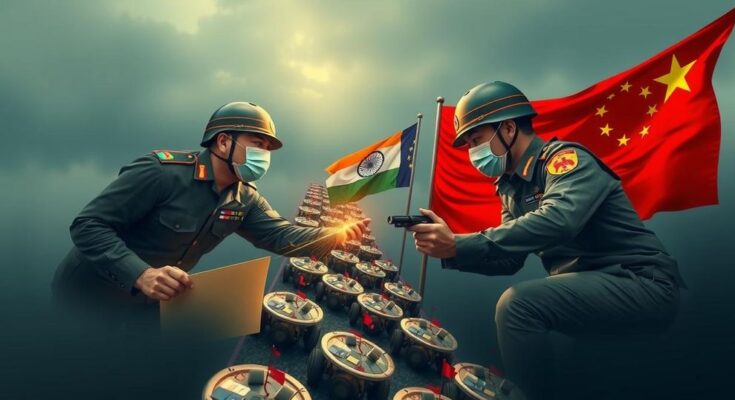External Affairs Minister Subrahmanyam Jaishankar attributed India’s recent breakthrough agreement on patrolling along the LAC with China to both military resolve and diplomatic efforts. The disengagement process commenced on October 21 and is expected to conclude by October 29, allowing for the resumption of patrolling. Jaishankar emphasized that normalization of relations will take time and highlighted ongoing negotiations since 2020 to address border tensions.
On October 21, the Indian and Chinese military began the process of disengagement in the Depsang and Demchok regions of eastern Ladakh, slated for completion by October 29. This development was acknowledged by Subrahmanyam Jaishankar, India’s External Affairs Minister, who credited both military efficacy and strategic diplomacy for this breakthrough regarding patrolling along the Line of Actual Control (LAC). In a recent engagement with students in Pune, Minister Jaishankar emphasized that while the agreement is a significant step, full normalization of relations between India and China would require time for rebuilding trust and collaboration. He pointed to the recent bilateral interactions, including the meeting between Prime Minister Narendra Modi and Chinese President Xi Jinping in Kazan, Russia, where the decision was made for foreign ministers and National Security Advisors to further engage on moving forward. Jaishankar remarked, “If today we have reached where we have… it is because of the very determined effort on our part to stand our ground and make our point. The military was there (at LAC) in very very unimaginable conditions to defend the country, and the military did its part and diplomacy did its part.” He further indicated the enhanced military resources being allocated, with expenditures five times greater than a decade ago, which has effectively bolstered India’s military readiness and operational capacity in the region. The minister noted the disturbances along the border that have persisted since 2020, adversely affecting the broader bilateral relationship. He highlighted the ongoing negotiations that began in September 2020 aimed at addressing the challenges posed by the troop build-up from both nations and establishing protocols for disengagement and de-escalation. Furthermore, Jaishankar detailed that the recent agreements primarily focus on the pressing need for disengagement, with troops being in close proximity, posing risks for potential confrontations. He explained that while certain understandings regarding troop movements were reached after the onset of tensions in 2020, the critical focus remained on resuming normal patrolling activities. The discussions culminated in a significant achievement on October 21, which provided for the resumption of patrolling in Depsang and Demchok, adhering to previously established protocols. (Incorporating inputs from PTI)
The relationship between India and China has been fraught with challenges, particularly concerning border disputes along the Line of Actual Control (LAC) in eastern Ladakh. Since 2020, tensions escalated due to troop concentrations and confrontations, resulting in a highly disturbed border situation that affected diplomatic relations. Beginning in September 2020, both nations engaged in negotiations to address these issues and sought ways to establish mutual understanding and disengagement protocols. The recent agreement for troop disengagement marks a crucial step in improving bilateral relations and managing border stability.
In conclusion, the agreement reached between India and China on patrolling along the LAC is a significant milestone achieved through military commitment and diplomatic negotiations. External Affairs Minister Jaishankar’s crediting of both factors underscores the importance of maintaining a robust defense posture while also engaging diplomatically. The completion of disengagement by the end of October represents hope for future normalization of relations, though further efforts will be needed to fully restore trust and cooperation between the two nations.
Original Source: www.hindustantimes.com




